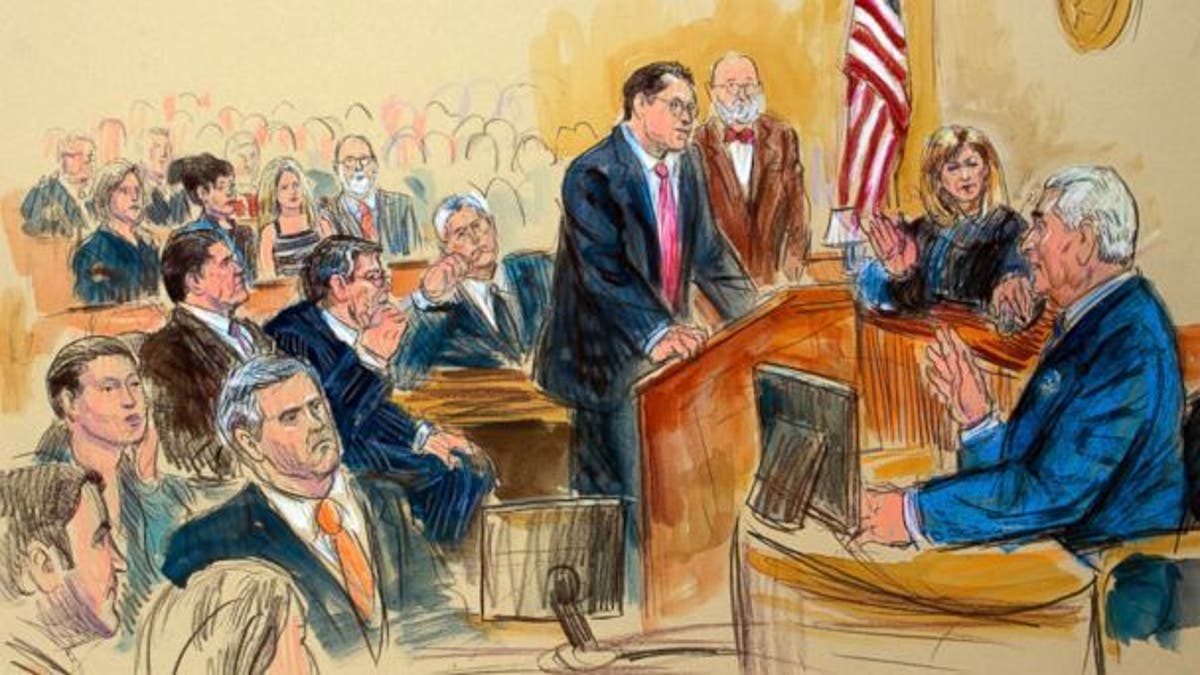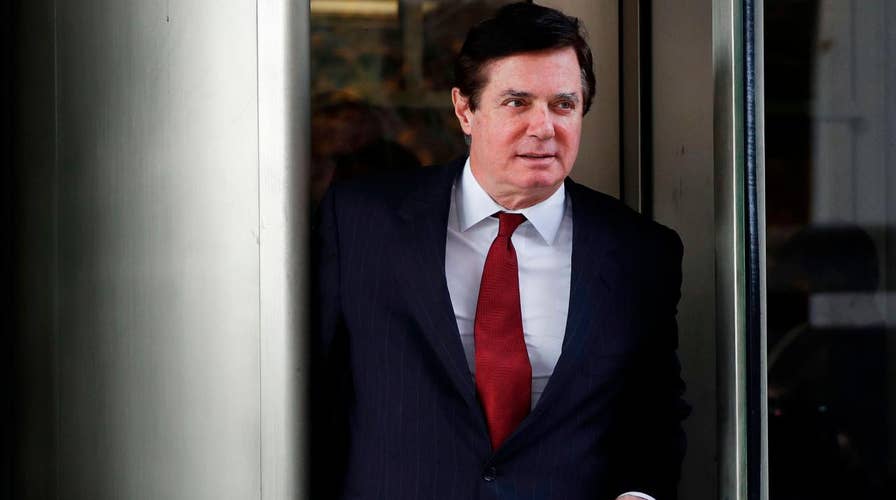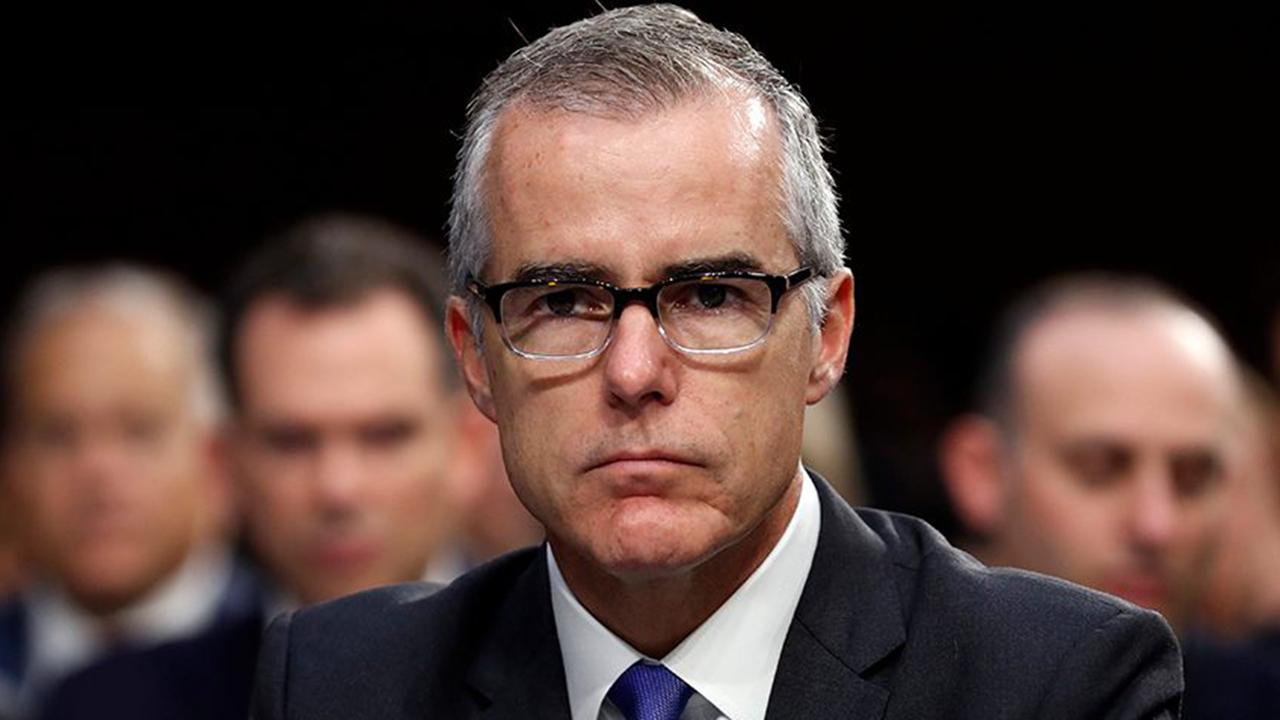Former Trump campaign chairman Paul Manafort on Wednesday faces his second federal sentencing this month, as Special Counsel Robert Mueller pushes for him to receive 10 additional years in prison on top of the 47-month term issued less than a week ago by Virginia Judge T.S. Ellis.
Two key questions remained lingering and unanswered in the hours leading up to the hearing. First: will Obama-appointed Washington, D.C. Judge Amy Berman Jackson allow Manafort to serve whatever sentence she gives him concurrently with that 47-month term -- a move that Mueller's prosecutors haven't outwardly resisted, and that Manafort's team argues is the most legally sound approach?
And second: Will President Trump, who has long characterized Mueller's Russia probe as a partisan "witch hunt" that unfairly has ensnared his onetime campaign manager, eventually issue a pardon or commutation regardless of what Jackson does? ("Why would I take [a pardon] off the table?" Trump asked last year.)
Mueller, in court documents, has stopped short of recommending a specific sentence in the D.C. case, but has argued that Jackson has no reason not to throw the book at the 69-year-old Manafort. The former lobbyist and political consultant avoided a trial before Jackson late last year by agreeing to cooperate with prosecutors and pleading guilty to two felony conspiracy charges related to his overseas lobbying work.
Jackson ruled in February that Manafort "intentionally" breached that plea agreement by lying to investigators, and Mueller's team has presented Manafort as a hardened criminal who "repeatedly and brazenly violated the law ... for over a decade."
Perhaps most significantly, Mueller's team alleged that Manafort had lied about an August 2016 meeting with Konstantin Kilimnik, a business associate who the U.S. said had ties to Russian intelligence. Mueller's prosecutors have said that cut to the "heart" of the Russia probe, but Manafort's lawyers have maintained that any misstatements by Manafort were immaterial or unintentional, and that there was no evidence Manafort had any illegal contacts with Kilimnik.

This sketch shows Judge Amy Berman Jackson presiding over the Roger Stone case earlier this year. (The Associated Press, File)
The meeting involved a discussion of a potential peace plan between Russia and Ukraine, but many other details about it have been redacted in court papers.
Federal sentencing guidelines called for Manafort to receive nearly two decades in prison, although the two charges to which Manafort pleaded carry a maximum term of 5 years imprisonment each. In the Virginia case, in which Manafort was convicted by a jury on eight bank-and-tax-fraud charges, Ellis said the guidelines of sentencing Manafort to between 19 and 24 years in prison were "excessive."
Unlike Ellis -- the Reagan-appointed Virginia-based judge who repeatedly taunted and tormented Mueller's team last year, and declared openly that Manafort was being prosecuted only to get to President Trump -- Jackson is widely seen as relatively sympathetic to the government's case against Manafort.
Judge Jackson has taken a tough approach in ongoing prosecution of longtime Trump adviser Roger Stone, which is also being run by Mueller. And, in 2013, the judge sentenced former Illinois Rep. Jesse Jackson, Jr., a Democrat, to 30 months in prison -- less than the 46 to 57 months requested by the government, but also significantly more than the 18 months defense attorneys had requested.
"The inescapable fact is that you and Sandra Jackson used campaign funds to sustain a lifestyle that you cannot afford,” Judge Jackson said at the time, referring to the congressman's wife. At the same time, the judge did cut the two something of a break by granting them the ability to serve their sentences at separate times to accommodate their two children.
Judge Jackson has a major opportunity to show similar leniency to Manafort: She has the authority to allow Manafort to serve his sentence in the D.C. case concurrently with the 47-month sentence from the Virginia case. And, Manafort's lawyers have argued there's a strong legal basis for Judge Jackson to do so, noting that federal sentencing guidelines ordinarily advise judges to exercise their discretion and consider allowing sentences to run concurrently where two separate criminal cases involve conduct "relevant" to one another.
In sentencing documents, Mueller did not take a position on whether Judge Jackson should afford Manafort that luxury, explaining that it was "unknown" what the sentence would be. Still, Mueller reserved the right to take a position later in court on Wednesday.
But, Manafort's team countered that he essentially had been caught at the wrong place at the wrong time.

A courtroom sketch shows Paul Manafort, in a wheelchair, awaiting his sentence in the Virginia case.
"It is fair to say that, but for the appointment of the Special Counsel and his Office’s decision to pursue Mr. Manafort for a rarely prosecuted FARA [Foreign Agents Registration Act] violation, Mr. Manafort would not have been indicted in the District of Columbia," the attorneys wrote to Jackson.
The defense team's filing also included numerous letters from friends and associates of Manafort arguing on his behalf. In one letter, a family friend wrote that Manafort frequently would cut short business trips and even take overnight flights, solely to see his children's basketball games and attend to other family responsibilities.
Further, Manafort's team argued, the relatively light sentences handed out in other cases prosecuted by Mueller should guide Jackson -- and provided evidence that Mueller has come up empty in his search for improper Russia collusion by the Trump team.
"The sentences already imposed in other cases that have been investigated and/or prosecuted by the Special Counsel’s Office reflect the fact that courts recognize that these prosecutions bear little to no relation to the Special Counsel’s core mandate of investigating allegations that the Trump campaign colluded with the Russian government to influence the 2016 election," the attorneys wrote.
They specifically cited the two-week sentence given to former Trump campaign foreign policy adviser George Papadopoulos for lying to the FBI, as well as the 36-month sentence given to former Trump lawyer Michael Cohen, who pleaded guilty to making false statements to Congress, five counts of tax evasion, one count of falsifying submissions to a bank and two campaign finance violations. Cohen was ordered to pay $1.4 million in restitution and a $50,000 fine, and to forfeit $500,000.
"The Special Counsel's attempt to portray [Manafort] as a lifelong and irredeemable felon is beyond the pale and grossly overstates the facts before this Court," the attorneys wrote, adding that the case has "devastated him personally, professionally, and financially."
Fox News' Jake Gibson and Alex Pappas contributed to this report.















































